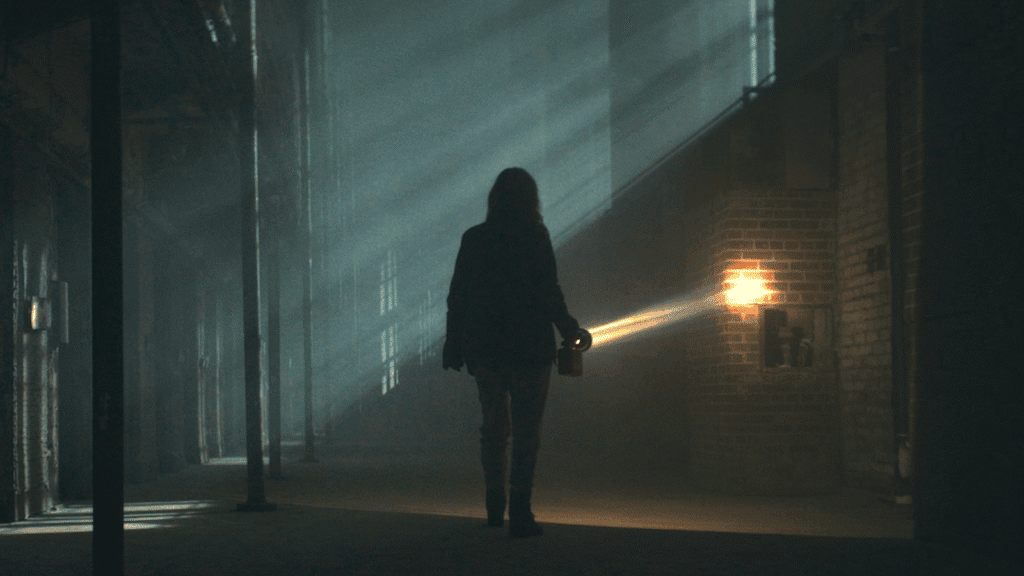Shelby Oaks
Recap
Riley Brennan, a member of the popular online show, "Paranormal Paranoids" has been missing for nearly twelve years. When a tape suggesting her survival winds up in the hands of her sister Mia, a hunt for here whereabouts ensues as the sickening remains of the once busy town of Shelby Oaks threatens to consume the sisters whole.
Review
If we are to believe the saying that “Imitation is the greatest form of flattery.” then Shelby Oaks might just be one of the most flattering films of the last five years. From The Blair Witch Project to Hereditary, there is an inescapable sense of familiarity that drowns out nearly everything special about this project—to the point where it becomes difficult to parse what I genuinely liked about this film, and what I simply liked about the films that inspired it. Much like Icarus, Chris Stuckmann has flown too close to the proverbial sun with this feature-length debut, one that has all the right pieces in all the wrong places.
On paper, this film sounds like the kind of character-driven narrative that sings within the horror genre and for the duration of the film’s opening act or so, it seemingly does. There’s a brilliant use of the found footage toolset that sets up the narrative hook while allowing the audience to connect, even briefly, to Riley Brennan as a person first and a plot device second. It adds a texture of reality to her disappearance that feels authentic, especially in the 21st century, where the ghosts of our loved ones are more likely to haunt social media than the family photo album. This opening crescendos with a hair-raising call to action that sets the tone for the remainder of the film.
It’s in these opening moments where Stuckmann’s strengths as a director shine through. He has a knack for short-form escalation within a longer narrative. The opening is structured almost like a self-contained short film—one that grips the audience and refuses to let go until the title card hits. The cinematography carries a rugged realism, and the team’s visual choices validate the found-footage device as more than a gimmick. The sensations conjured by the film’s visual language are immaculate: tension, unease, fear. Even when the script falters, the direction stands tall above it all.
Unfortunately, once that gripping opening yields to the rest of the story, Shelby Oaks shifts from shockingly brilliant to over-inspired slop. The film is paced like an awkward survival horror game, with Mia forced to stumble from location to location without much logic or emotional progression guiding her forward. Her journey to find Riley is laced with narrative conveniences that might have been excusable if they built toward greater depth—but instead, the film tries to Hereditary its way into faux-mystery by staying deliberately vague about its supernatural elements. When you have characters as well-written as those in Hereditary, that ambiguity works. Here, it feels hollow. The audience is not engaged in piecing the story together, instead left attempting to find the internal logic the script was too lazy to find itself.
That frustration encapsulates what makes Shelby Oaks such a disappointing film. It lacks a cohesive soul. The ideas are there—plenty of them—but the ones that could have given the story real bite are the ones least developed. Mia’s struggle with her protective instincts and the psychological cost of that role could have been genuinely disturbing in the hands of a more seasoned writer. You can see shades of Sinister, Rosemary’s Baby, and Lake Mungo in its DNA, yet those influences are so pronounced that they don’t make the film predictable—they make it dull. Mia becomes less a character and more a vessel for the plot, stripped of agency in a story that should have been defined by her.
That being said, Camille Sullivan’s performance as Mia is strong enough to convince you that something deeper couldhave been happening beneath the surface. She glows in every scene, her intelligence tempered by an emotional dependency on her sister that gives her decisions tragic weight. It’s a performance that suggests more complexity than the script delivers. Opposite her, Sarah Dunn’s restrained take on Riley complements Sullivan beautifully, grounding the supernatural with genuine pathos.
Final Thoughts
In the end, Shelby Oaks is a film caught between ambition and imitation. Its director shows flashes of brilliance, its performers bring emotional credibility, and its aesthetic sensibilities are top-tier. But without a clearer sense of purpose or identity, all of that talent becomes trapped in the shadow of better films. There’s plenty to admire in Stuckmann’s debut, but for all its borrowed power, it never quite finds a heartbeat of its own.
Shelby Oaks: Haunted by Trope
- Writing - 5/105/10
- Storyline - 5/105/10
- Acting - 7/107/10
- Music - 6/106/10
- Production - 8/108/10
